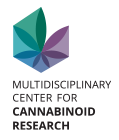Samah Shahen-Zoabi, Reem Smoum, , Beiser, Tehila , Nemirovski, Alina , Raphael Mechoulam, , and Yaka, Rami . 2022. “N-Oleoyl Glycine And Its Derivatives Attenuate The Acquisition And Expression Of Cocaine-Induced Behaviors.”. Cannabis And Cannabinoid Research. doi:10.1089/can.2022.0005.
Introduction: The endocannabinoid system (ECS) plays a key modulatory role during synaptic plasticity and homeostatic processes in the brain and plays an important role in the neurobiological processes underlying drug addiction. Impaired endocannabinoid (eCB) signaling contributes to dysregulated synaptic plasticity, increased stress responsivity, and craving that propel addiction. Therefore, we hypothesized that boosting the ECS by exogenous administration of selective eCBs will attenuate cocaine-induced behaviors. Materials and Methods: The behavioral paradigms included psychomotor sensitization (PS) and conditioned place preference (CPP). Liquid chromatography-mass spectrometry analysis was used for quantitative profiling of eCBs in mouse brain. Results: We first measured the levels of eCBs in different brain areas of the reward system following chronic cocaine treatment. We found that following daily administration of cocaine, the levels of N-oleoyl glycine (OlGly) were significantly elevated in the nucleus accumbens (NAc) in a region-specific manner. We next tested whether administration of OlGly will attenuate cocaine-induced behaviors. We found that administration of OlGly during withdrawal, but not during acquisition of PS, attenuated the expression of cocaine sensitization. In addition, the administration of OlGly during the acquisition of cocaine CPP, but not during withdrawal, attenuated the expression of cocaine-conditioned reward. To enhance the stability of OlGly and its duration of action, two methylated derivatives of OlGly were synthesized, the monomethylated OlGly (HU-595) and dimethylated OlGly (HU-596). We found that the effect of administration of HU-595 or HU-596 during cocaine conditioning did not differ from the OlGly-induced decrease in the expression of CPP. Conclusion: Our findings suggest that the ECS is involved in the common neurobiological mechanisms underlying the development and expression of cocaine reward and drug-seeking. Boosting the ECS exogenously has beneficial effects against cocaine-induced behaviors.
